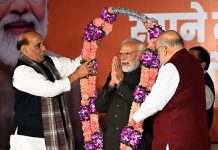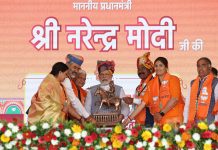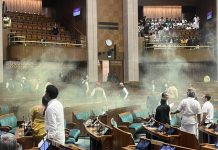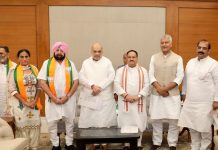Shehla Rashid Shora, Politic al Activist, former Vice-President JNU Students’ Union and Ph.D. Scholar at JNU, is one of the few young women leaders in the country today. Unafraid to speak her mind, she is often in the midst of controversies and at the receiving end of online trolls. In an interview with Pari Saikia, the feisty youth icon says that the struggle is worth it as it will encourage more females to come out and claim their legitimate share in leadership roles that have been denied to them.
al Activist, former Vice-President JNU Students’ Union and Ph.D. Scholar at JNU, is one of the few young women leaders in the country today. Unafraid to speak her mind, she is often in the midst of controversies and at the receiving end of online trolls. In an interview with Pari Saikia, the feisty youth icon says that the struggle is worth it as it will encourage more females to come out and claim their legitimate share in leadership roles that have been denied to them.
Edited Excerpts from an interview •
On the occasion of International Women’s Day, what message would you like to give to the women of our country?
Women have to start staking their claim in positions of power and decision making, and we must not be ashamed to do so. It is okay for men to be ambitious and prioritise their career and their ambitions of leadership. We, women, need to stop being ashamed of prioritising our goals. One tangible result of women’s participation in public life and representation in leadership roles is that there will be a decline
in sexual violence. We have to pave way for women of the next generation. We must understand that we are just beneficiaries of the struggles by women in the past. We have not had to fight for the rights and freedoms that we have. So, we must not squander our freedoms, but expand them further for the sake of younger women.
Time and again, you have been vocal against various harassments, be it online or on roads, and have become a face of the youth of India. Can the voice of a female activist help change prejudiced mindsets?
Yes, but there won’t be a tangible improvement in women’s condition until and unless enough women are in leadership roles and public life. Till the time there is only a handful of us who are outspoken, we will keep echoing men’s views. We have to be one another’s support system, and develop an independent voice on issues. This will take a lot of structural changes. Women’s education and economic empowerment is an urgent and crucial area that requires a lot of work. I believe that increased participation of women can also pave way for a more progressive politics, as women have first-hand experience of oppression and can, hopefully, relate better with oppressed people.
You are trolled incessantly for being anti-Modi; being a woman and also a Muslim worsens the right-wing attacks on you. Do you think women are at the receiving end of such criticism because of their gender and that it isn’t so in the case of men?
The sexualised, graphic and violent nature of comments made by online trolls has convinced me that these are mostly men who are so misogynistic that they haven’t had female friends, or the chance to converse with women as equals. I often wonder how they interact with women in their family. They must be very abusive or dominating at home too. These people have a phobia of independent women, and they are the ones who end up having fascist beliefs and ultra right-wing ideologies.
What is the best way in which you believe that trolls can be dealt with?
The ruling party is engaging in organised harassment by targeting dissenters and, thereby, creating an environment where violence and harassment is okay. They are creating a new normal. We have to organise and make the point that harassment is not okay. I do not have hopes from the government, as government is benefiting from the activities of abusive trolls. But we must organise to put pressure on political leaders, government functionaries and social media platforms.
The Prime Minister should stop following abusive, hate-speech peddling Twitter users. As a political activist, I routinely discourage my supporters from hurling abuses at BJP supporters. I often disown violent words and tell my supporters not to use sexist abuses for opponents. I feel that all political leaders, especially women from all parties, need to do this. Twitter and Facebook have a virtual monopoly on social media and, therefore, they need to act more proactively and suspend accounts of people who engage in such organised harassment.
Is student politics gaining significance in India at a time when polarized politics is being played? What role do you see yourself playing here?
Students across the world – from Chile to Germany to South Africa to India to the US — are organising to demand educational and political rights. Right-wing governments across the world are trying to crackdown on students because we ask intelligent questions.
The first thing that any right-wing government does is cut down the funding on education. Educated people who are equipped to ask questions are bad news for any government which wants to engage in corrupt practices, subversion of Constitutional values and/or communal violence. Our humble role, as student activists, is to remind people of their rights, remind people that they deserve better.
What’s your take on women’s participation in politics of India, especially Muslim women?
The representation of women in legislatures is several times less than their population percentage. I’ve been quite vocal about my views on the subject, so I’ll put it in very simple terms. If men want their daughters and sisters to be safe from sexual violence, then they need to support women and help them get into positions of leadership. They need to encourage women in their families to go out and claim their share — nothing short of half the earth and half the sky. It is only when the representation of women in the Parliament, on the streets, and in institutions is equal to that of men that women will be safe from violence.
A lot of communal politics is played around tropes related to Muslim women. The same party whose leaders advocate rape of Muslim women talks about ‘liberation’ of Muslim women. I really think it is time for more Muslim women to come into public life and leadership and speak for themselves. Muslim men will have to play a huge role in this. They have to support Muslim women get into these roles.
letters@tehelka.com













